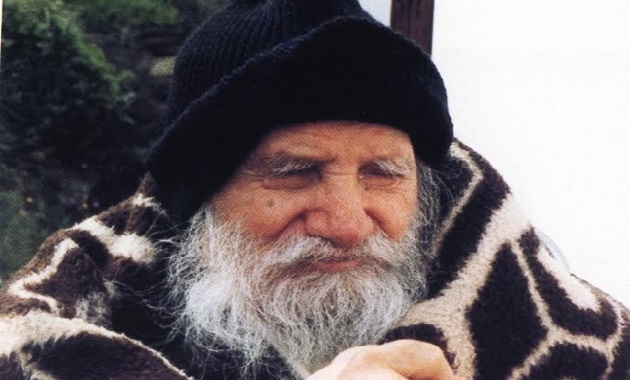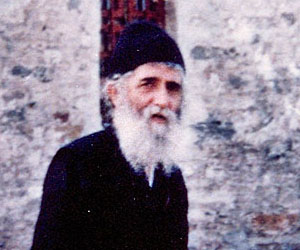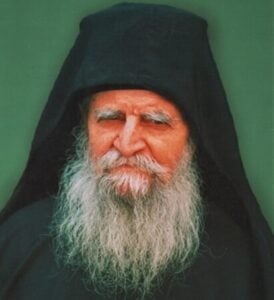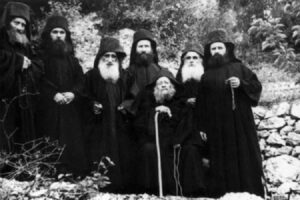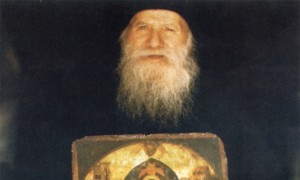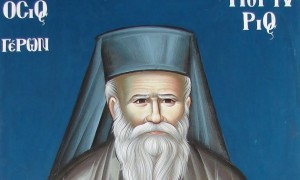Saint Porphyrios Kavsokalyvitis (Part I)
1 December 2022‘Now you must be thinking, from what I’ve told you, that – well, I don’t know – I’m quite something. Well, I’m nothing, although I do try and am just beginning, it seems, to get a taste of the things that I talk about. I try to, I want to, and I actually do feel love for others, although I don’t want to force myself. But very often I experience these things through God’s Grace and do not speak. I’m not allowed to. I say whatever I’m allowed to say but I cannot always speak. Well, life without Christ is not worth living. There’s no doubt about that.’
Elder Porphyrios was born in 1906 in the village of Agios Ioannis in Karystia province on Euboea and was baptised as Evangelos. He spent only two years at school. His teacher’s illness and his family’s poverty forced him to earn his keep by tending the few animals that his family owned. A little later, as a young boy of about nine, he worked in the local coal mine and then in a grocer’s store in Piraeus that was owned by a family acquaintance. His father had gone to work on the Panama Canal in order to provide for his family.
As an eight year-old shepherd boy he came into possession of a booklet about the life of St. John Kalyvitis, which he read with great difficulty. This saint deeply impressed the young Evangelos and filled him with a strong desire to lead a life like his. Thus, when he was about twelve years old, he secretly left on his own for Mount Athos and on a ship on the way there met the man who would soon become his elder, the hieromonk and spiritual confessor Panteleimon, who lived as an ascetic in the kalyve1 of St. George at the Skete of Kafsokalyvia on Mount Athos.
It was to this elder and his natural brother, the monk Ioannikios, that the young novice paid full and joyful obedience. A few years later he was deemed worthy to be tonsured as a monk and to learn the secrets of the spiritual life through practical experience.
One consequence of his great love for Christ and his elders and his obedience and asceticism was that he was visited by God’s Grace and at a young age received the gift of clairvoyance, that is to say, the ability to see, through the operation of God’s Grace, invisible things or spirits or past or present events, or sometimes even future events.
While he was on Mount Athos he suffered a bout of pleurisy at about the age of eighteen and his elders sent him to a monastery outside Athos for treatment. At this monastery on Euboea he met the Archbishop of Sinai, Porphyrios, who, after observing that the young monk had been visited by God’s Grace, ordained him as a priest at the age of twenty. A little later the local metropolitan bishop made him a spiritual confessor and so the gift of clairvoyance with which God had endowed Porphyrios was placed at the service of the faithful. With this gift the young hieromonk and spiritual confessor Porphyrios helped people to escape from various snares of the Devil, to understand what was going on in their souls, to reject the deceitful claims of witches who drained them of all their money under the pretext that they could break the spells that afflicted them, to discern and heal their bodily ailments and their causes, and generally to see and understand things that would help them in their lives.
In 1940 Porphyrios was appointed chaplain at the Polyclinic in Athens, in Sokratous St. near Omonoia Square. He remained in this post for thirty-three years, giving confession to both patients and others, praying, advising and on no few occasions healing patients who asked for his help through God’s Grace and prayer. Although he studiously concealed his gifts, he became known to a relatively small group of believers that gradually grew in number.
In 1950 he rented the abandoned little monastery of St. Nicholas Kalission on Mt. Pendelis and up until 1978 spent time cultivating the land around it. In 1979 he settled at Milesi in Attica, near Oropos, where, after obtaining the necessary legal permits, he began to build the Hermitage of the Transfiguration of the Saviour. Here he received visitors from all walks of life and telephone calls from all over the world to discuss a variety of problems, and he gave advice, prayed, heard confession, and healed the souls and very often the bodies of the people who approached him.
In June 1991, sensing the end of his life was near, and wishing to avoid a large public funeral, he left for the kalyve of St. George at Kafsokalyvia on Mount Athos where he had been tonsured as a monk some seventy years earlier. At 4.31 a.m. on 2 December 1991 he gave his spirit up to the Lord, whom he had loved so much during his life. There he was buried in a simple monk’s grave in the presence only of his fellow monks, for he had very humbly requested that his passing should not be made known until after his burial. Nowadays this grave is occupied by another monk as Elder Porphyrios’s remains have been concealed in an inaccessible place, in accordance with an instruction that he left his novices.
His main characteristics
The main characteristics of Elder Porphyrios’s character throughout his life were his extreme humility, his perfect love for Christ and his fellow men, and his sense of belonging to the Church, with his complete obedience to it in Christ, his absolute unity with all men, and his sense of immortality and freedom from fear and the hell of life here on earth. To these should be added his uncomplaining patience in the face of unbearable pain, his wise discernment, his inconceivable power of clairvoyance, his boundless love of learning, the astonishing breadth of his knowledge (which was a gift from God and a fruit of His Grace and not a result of study), his industriousness and inexhaustible love of hard work, his constant, humble and therefore effective prayers, his supremely Orthodox though not fanatical mentality, his sound advice, the diversity of his teachings, his very profound piety, the majestic solemnity of the church services that he conducted, and the great care with which he kept his numerous good works secret.
[To Be Continued]

